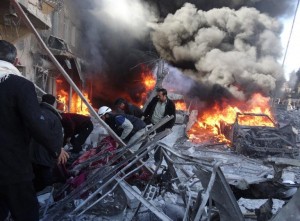Special to WorldTribune.com
NICOSIA — President Bashar Assad is said to have overseen an increase in barrel bomb attacks against Sunni rebels in Syria.
The opposition said the Syrian military has intensified its use of barrel bombs against rebel strongholds.

The opposition Syrian Observatory for Human Rights said the attacks, in which oil drums packed with explosives are dropped from helicopters, killed nearly 100 people on Feb. 1.
“At least 85 people were killed, including 65 civilians, 10 of whom were children,” Syrian Observatory said on Feb. 2.
Western diplomatic sources confirmed the opposition report. The sources said the Syrian military’s use of barrel bombs reflected a shortage of munitions by the Assad regime over the last few months.
The opposition said most of the barrel bomb strikes were taking place around Aleppo, about 40 percent of which was still in rebel hands. The British-based Syrian Observatory said the Syrian military dropped barrel bombs on a stronghold of Al Qaida’s Nusra Front for the Defense of the Levant.
The use of barrel bombs, capable of destroying buildings, has increased amid preparations for a major offensive by the Syrian military on Aleppo. On Feb. 2, the Syrian official media said the army captured two Aleppo neighborhoods — Karam Al Turab and Bani Zeid.
Syrian Observatory also reported the Syrian military’s use of barrel
bombs around rebel-held areas in the southern suburbs of Damascus. The
organization said the Syrian Air Force also fired air-to-ground missiles on
rebel strongholds as civilians sought to flee.
The opposition has asserted that the Assad regime was being aided by Al
Qaida’s Islamic State in Iraq and Levant. On Feb. 2, ISIL captured positions
along the Turkish border at Al Rai as well as a gas field in the Dir Al Zour
province. ISIL also killed two key rebel commanders, identified as Adnan
Bakour, who led the Tawhid Brigades and Abu Hussein Al Dik of Suqr Al Sham.
A British newspaper reported that Assad, who pledged to surrender such
arms, was also stockpiling biological and chemical weapons in western Syria.
The Sunday Times said the weapons of mass destruction were being upgraded by
Iran and North Korea.
“[This] as an insurance policy in case [Assad’s] country is eventually
partitioned,” the newspaper, quoting Israeli and Russian sources, said.
“This [western] region is now totally fortified and isolated from the rest
of Syria.”

You must be logged in to post a comment Login